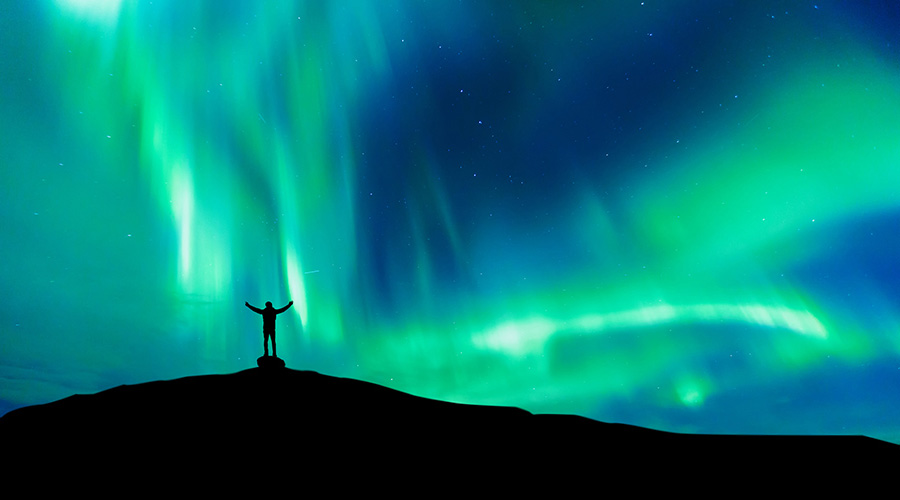
According to a study published in the academic journal Nature Communications, the dancing northern lights are the result of collisions between gaseous particles in the Earth’s atmosphere with charged particles released from the sun’s atmosphere. Also, the variations in colour are due to the type of gas particles that are colliding.
Well, if you’re interested in scratching this beloved collision of gaseous particles from the Earth and Sun off your bucket list, it’s just a matter of figuring out which incredible destination will be the setting for the experience.
Where Can You See the Northern Lights?
To see the Northern Lights, head to high-latitude regions near the Arctic Circle. Norway, Sweden, Finland, and Iceland all provide excellent views. In Canada, check out the Yukon, Northwest Territories, and northern parts of provinces like Alberta. In Alaska, travellers check out the starry views from cities like Fairbanks and Talkeetna. Occasionally, the lights like to make surprise appearances in locations you wouldn’t expect — in May of 2024 the northern lights were spotted in the UK, Tennessee, Minnesota, Washington state, parts of New England, and more.
When is the Aurora Borealis Visible?
The northern lights are best observed during the winter months, from late September to early April. This period offers the longest hours of darkness and the clearest skies, essential for viewing this natural light display. Weather conditions play a crucial role also. Clear, cold nights with minimal cloud cover and low light pollution provide the ideal setting. The auroras are most commonly visible in high-latitude regions near the Arctic Circle, where the geomagnetic activity is strongest and atmospheric conditions are most favourable.
Top 3 Northern Lights Tour Packages
Northern Lights in Iceland
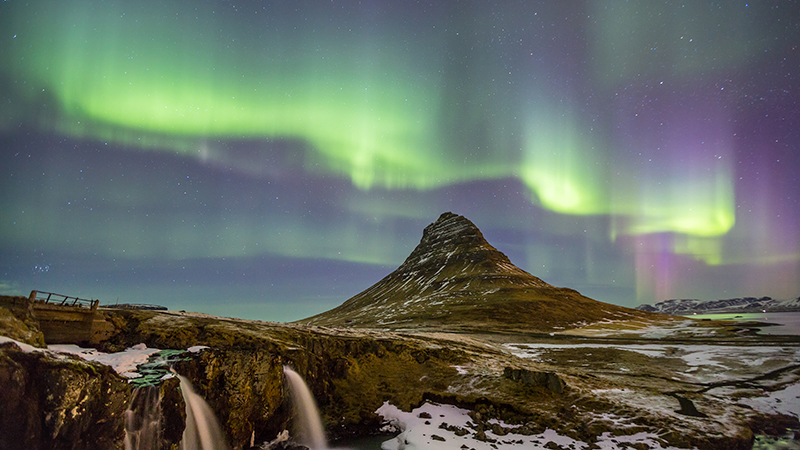
Immerse yourself in the “land of fire and ice” and chase the aurora borealis through a mesmerizing wonderland. Embark on a starlit evening cruise to hunt for the northern lights in the darkness. Explore the famed “Golden Circle,” which includes breathtaking natural landmarks like Thingvellir National Park, the majestic Gullfoss waterfall, and the explosive geothermal fields of Geysir. Discover traditional turf-built homes at Skógar Museum and stroll along a striking black volcanic sand beach. Witness the serene beauty of Jökulsárlón glacial lagoon, adorned with floating icebergs, and unwind in the soothing, mineral-rich waters of the Blue Lagoon. Enjoy days surrounded by nature's marvels and nights in pursuit of the enchanting dancing lights.
Explore this Iceland northern lights tour package now.
Finland Northern Lights Experience
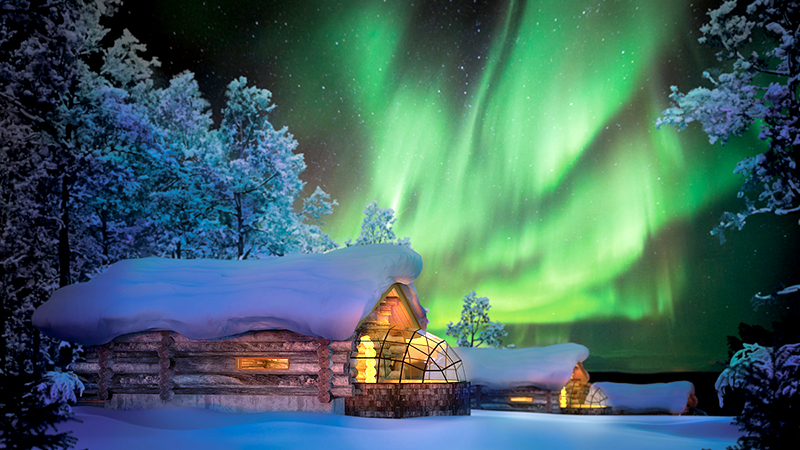
Chase the elusive northern lights and immerse yourself in the wonders of Finland, the "Daughter of the Baltic." Discover the rich culture and history of Helsinki with a knowledgeable local guide, and indulge in the city’s culinary delights. Explore the untamed beauty of Lapland during a 3-night adventure in northern Finland. Spend a night under the stars in a glass igloo and another in a cozy Finnish log cabin. Enjoy a thrilling reindeer safari with a local herder, and glide to breakfast on a Finnish sleigh. Take the reins of your own dog sled team and experience a series of unforgettable moments on this extraordinary journey through Finland.
Book your Finland northern lights tour package here.
Northern Lights in Alaska
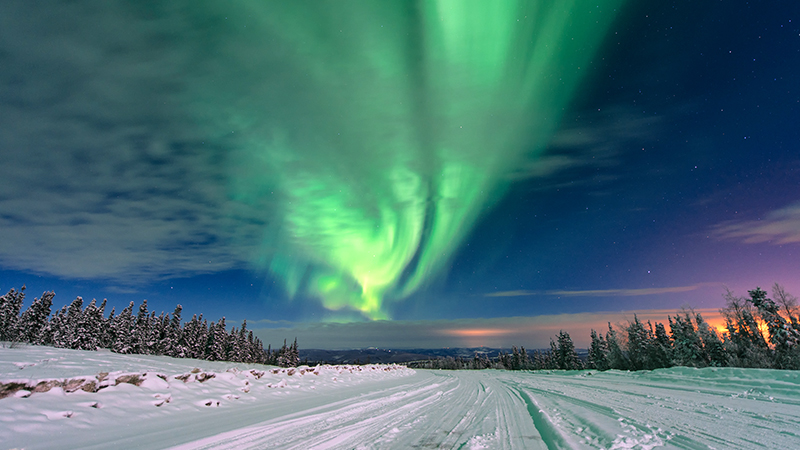
Explore the snowy wonders of Alaska with a visit to its charming frontier towns and a chance to bond with spirited sled dogs. Enjoy a winter glacier cruise amid drifting icebergs and playful otters. Spend a night at the Talkeetna Alaskan Lodge, where you'll be treated to breathtaking views of Denali and the Alaskan Range. Discover history at the Musk Ox Farm and search for the northern lights under Fairbanks’ star-studded sky. Step back in time at the Antique Auto Museum, where vintage cars are showcased alongside historical artifacts and elegant designer dresses. Travel aboard the Alaska Railroad, soaking in the stunning natural beauty and deep-rooted heritage of this extraordinary landscape.
Learn more about this Alaska northern lights tour package.
Aurora Borealis Photography Tips
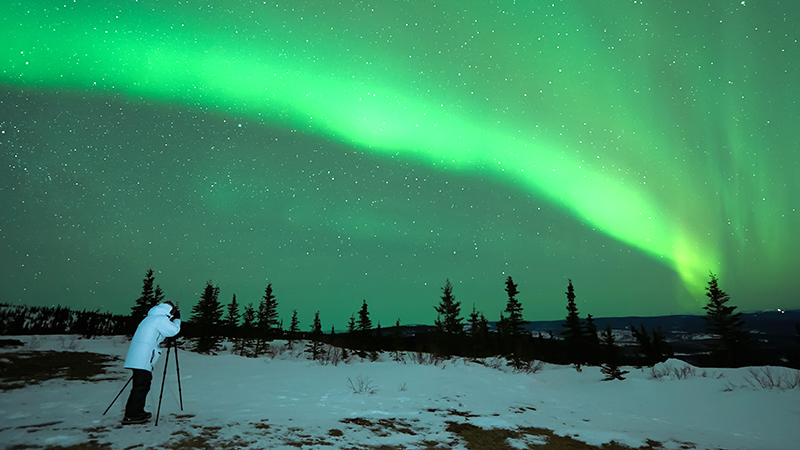
Tripods for northern lights photography
Regardless of the type of camera you own, using a tripod will greatly increase the quality of any picture you take of the northern lights. Whether using a smartphone, digital point-and-shoot camera, or Digital Single-Lens Reflex (DSLR) camera, a tripod stabilizes the device, and since you’ll be shooting in low light conditions, a longer exposure is required, meaning your lens will stay open longer, and even the slightest shaking will be noticeable.
Quick tip: stay away from the carbon fibre tripods - they break easily when temperatures are low.
Batteries and power packs
It's a known fact that cold temperatures drain batteries at a faster rate than warm temperatures. When waiting for the northern lights to come out and play, keep devices as warm as possible, especially smartphones and point-and-shoot cameras, which can easily be slipped into pockets to stay cozy. It would also be a good idea to consider carrying extra batteries for your device, or a portable power bank.
No Flash
To capture the aurora borealis, your goal is to be away from light pollution — don't bring your own with you! Turn off your flash, as it’ll wash out the light display you’re trying to capture.
Focus
Since the northern lights are at such a distance, setting your camera's lens to focus to infinity will be your first chore. Some lenses have an infinity symbol (∞), which will simplify everything; others require a little set-up.
Should you not know how to complete the following steps, you will need to refer to your user's manual, or a local camera expert. Use the "Live View Mode" of your camera and zoom in. Focus on the most distant point in your composition, as this is how you will know that you've set your lens to infinity.
Camera settings
Now that you’ve set your focus, start working on how to best adjust your camera's settings. Depending on how bright the northern lights are, and how fast they're moving, the settings range from 30-second exposures at f/3.5 ISO 800 to 5-second exposures at f/2.8 ISO 3200. To minimize blur, increase the ISO and open up for only a few seconds.
Can You See the Northern Lights with an iPhone?
Capturing the Northern Lights with an iPhone has become increasingly feasible thanks to recent technological advancements. Modern iPhones, like the iPhone 14 Pro and later models, feature improved low-light capabilities and advanced Night mode settings, which are ideal for photographing the aurora borealis. By enabling Night mode and using a tripod or stable surface to keep your phone steady, you can capture stunning images of the shimmering lights.
Book Your Northern Lights Tour Package with Collette
If you’re planning a once-in-a-lifetime northern lights trip, you’ll want to make the most of your time. Luckily, the expert tour designers and tour managers at Collette have already got you covered with tour packages that cover the must-sees, cultural experiences, culinary inclusions, and more. With an expert guide leading the way, you won’t miss an opportunity to catch a glimpse of the lights, and chances are, you’ll make a friend or two along the way.
Ready to start planning your trip?
Call us at 877.913.8687 or see your travel professional and ask for Collette.

